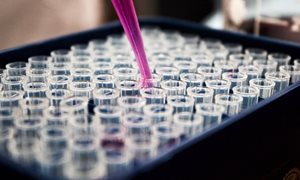
When B cells of the immune system no longer have the protein CD37 on their surface, they can change into tumor cells that form blood cancer. CD37 inhibits fat uptake in B cells. If this protein is missing, a tumor cell absorbs much more fat and therefore grows faster. These findings were published by the team of Annemiek van Spriel in Nature Communications and offer a stepping stone to new therapy in B cell lymphoma.
All cells of our body contain over a thousand different kinds of proteins on their surface. These proteins are true organizers: they control food uptake into the cell, maintain contact with neighbors and provide communication with more distant cells. An important group of these surface proteins are the so-called tetraspanins. These proteins occur mostly together with other proteins on the same cell. They form small islands, where they regulate all kinds of biological processes.
‘We still know very little about tetraspanins, but we are seeing more and more evidence that they play a role in cancer’, says Annemiek van Spriel, professor of Experimental Immunology at Radboud university medical center. She has been studying tetraspanins for nearly 20 years, unraveling their functions step by step. ‘We use models in which we delete a specific tetraspanin and study what happens. For example, we recently discovered that certain immune cells, called B cells, derail when they no longer contain the tetraspanin CD37. This has severe consequence since they then turn into tumor cells.’
Greasy bite
The mechanism behind this derailment remained unclear for a long time, but now Van Spriel and her team have figured out how this works. ‘CD37 inhibits the uptake of fat in healthy B cells via special fatty acid channels. If CD37 is missing, a cell can therefore absorb much more fat. Fat is the basis for all kinds of building blocks in cells and contains a lot of energy, much more than sugar. A cell that absorbs a lot of fat can therefore grow and divide faster than a normal cell, which is exactly what tumor cells do. The lack of CD37 therefore turns a healthy cell into a tumor cell faster.’
When B cells become tumor cells, they form a type of blood cancer called B-cell lymphoma. The most common and aggressive form is DLBCL (diffuse large-cell B-cell lymphoma), a disease with 1,500 diagnoses annually in the Netherlands. Van Spriel investigated tumor material from these patients: ‘We discovered that half of them did not have CD37 on the outside of the tumor cells. That turned out to be precisely the group that have a less favorable prognosis: these patients respond less to the current standard therapy, a combination of chemotherapy and immunotherapy, and they have a shorter survival.’
Switch
Do these findings offer starting points for new therapy? ‘There are drugs that specifically bind to CD37. If you administer them, they induce tumor cell death’, Van Spriel explains. ‘Together with the company Genmab we are investigating new forms of immunotherapy directed against CD37. In addition, you can achieve more effect with combination therapies, such as chemotherapy or radioactive radiation. This therapy is however only suitable if tumor cells still have CD37.’
But precisely the tumor cells without CD37 present a worse prospect for patients. ‘For this group, we are investigating alternative options’, says Van Spriel. ‘Currently, several preclinical studies are under way in the United States in models with blood cancer and also other cancer types, testing new drugs that block the channels for fat transport. These compounds could take over the role of the missing CD37 and inhibit tumor growth. It is very encouraging that fundamental work on proteins on the cell may facilitate the development of new options for therapy in cancer patients.’
Cells of an agressive B-cell lymphoma (cell nuclei in blue) without CD37 contain many fat droplets (in green).
About the publication
This research was published in Nature Communications: Fatty acid metabolism in aggressive B-cell lymphoma is inhibited by tetraspanin CD37. Rens Peeters, Jorge Cuenca Escalona, Esther A. Zaal, Anna T. Hoekstra, Anouk C. G. Balvert, Marcos Vidal-Manrique, Niek Blomberg, Sjoerd J. van Deventer, Rinke Stienstra, Julia Jellusova, Martin Giera, Luciana Hannibal, Ute Spiekerkoetter, Martin ter Beest, Celia R. Berkers, Annemiek B. van Spriel.
-
Want to know more about these subjects? Click on the buttons below for more news.
More information
Annemarie Eek

wetenschapsvoorlichter
Related news items

Radboudumc receives 2.6 million Euro from KWF for cancer research
22 December 2021 The Dutch Cancer Society (KWF) is awarding funds with a total of more than 2.6 million euros to five new research projects. The awards are part of the latest round of funding from KWF, in which almost 27 million euros is being allocated to Dutch cancer research. The projects will start in mid-2022. go to page




